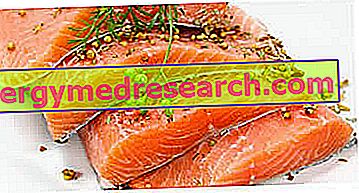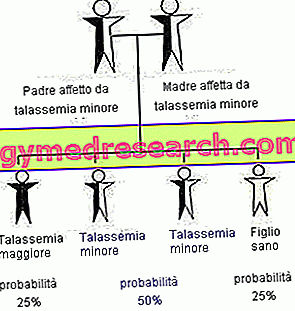What are
As it is easily deducible, fish proteins are characteristic molecules of pinnuti-aquatic animals that breathe in the liquid through the gills;

Fish proteins are defined as high biological value peptides (VB = 78), since they contain a mapping of essential amino acids (AAE) very similar to that of human proteins.
Fish and nutritional content
Proteins but not only!
Fish, together with other fishery products, land meat, offal and eggs, constitutes the first of the seven food groups; like the other products mentioned (... but subject to specificity!), the fish brings good amounts of heme and ferrous iron, B vitamins (especially thiamine, niacin, riboflavin and cobalamin) and the already mentioned high value proteins biological (the latter present in portions of 15-27% compared to the total edible portion). The fish also contains cholesterol, saturated fats and essential fats of the omega-3 family (EPA and DHA) but, on the other hand, NOT being vegetable, NOT providing dietary fiber, phytosterols, good part of antioxidants, folic acid and many other vitamins, such as ascorbic acid. This means that a diet rich in fish is not necessarily balanced and must at least be completed by the presence of fruit and vegetable foods and cereals.
Fish protein
Fish proteins are similar, but NOT equal to those of meat; it is true that the amino acids ("bricks" of the peptides) are the same, but their organization and their concentration are different. To be sure, fish proteins are not only different from those of terrestrial animals or eggs or milk, but they also have a considerable variance among them! Sea fish proteins, compared to freshwater fish proteins, have a slightly different composition, so much so that, following degeneration (bacterial and / or enzymatic) of muscle tissue, the meat of sea fish is free ( starting from triethylamine ) methylamine (TMAO - which then turns into dimethylamine, monoethylamine and formaldehyde, giving the typical smell of rotten fish), while the flesh of fresh water fish releases (for degeneration of lysine ) a molecule called piperidine . However, both types of fish subjected to advanced degradation are characterized by the production of sulphidric acid (by splitting sulfide bridges of proteins and by bacterial and / or enzymatic demolition of the sulphured AAs themselves) and biogenic amines ( histamine, tryptamine, cadaverine, putrescine and tyramine ); read the article: "Fresh fish and its conservation".
Ultimately, however, what interests essentially the field of human nutrition is the VB referred to the average of fish proteins; this is equal to 78, that is a score close to the maximum one, instead typical of human or egg proteins.
A final little clarification is to be made on the structure and function of fish proteins which, from a food standpoint, can be more or less DIGERIBLE. Among the various peptides contained in the meat of fish species, sarcoplasmic species are scarce, in particular globular proteins (such as globulin ), and those of connective tissue ( collagen fibers, reticular fibers and elastic fibers). The latter group of proteins, which in compact meat retain their compactness even after cooking the food, is responsible for prolonging the gastric permanence and for this reduces the digestibility of the food; fish proteins, on the other hand, which contain few, are much more digestible than those of meat.
Health
Fish proteins have been, and still are, the subject of numerous nutritional and medical studies; it seems that the consumption of fish, in particular of its fats and proteins, determines: a reduction in the incidence of overweight and an improvement in metabolic parameters (arterial pressure, cholesterolemia, triglyceridemia, systemic inflammation, global cardiovascular risk), all aspects promoting the health of human beings.
While lipidemia appears to benefit enormously from the nutritional supply of essential polyunsaturated fatty acids of the omega-3 series, present in fish, fish proteins intervene reducing systemic inflammation (in particular, the reactive C protein) and improving insulin sensitivity ; both of these characteristics make fish proteins an important protection factor against type 2 diabetes mellitus.
NB : The studies were carried out using cod proteins and further investigations are expected regarding the other main species.
It's not over here! Other insights have investigated further beneficial effects of fish proteins on human metabolism, but this time of a bio-regulatory nature; in fact it seems that the administration of proteins of the Blue whiting ( Micromesistius poutassou ) intervenes positively on the mechanisms of satiety reducing the introduction of food. This characteristic, observed on the behavior of rats, was then justified by the hormonal analysis of the sample, which demonstrated the ability of fish proteins to stimulate the secretion of gastrointestinal mediators responsible for satiety: cholecystokinin (CCK) and glucagon peptide- 1 (GPL-1). The result is therefore a physiological improvement of body weight regulation.
Bibliography:
- In vitro and in vivo evidence for a satiating effect of fish protein hydrolysate obtained from blue whiting (Micromesistiuspoutassou) muscle - Cudennec B, Fouchereau-Peron M, Ferry F, Duclos E, Ravallec R - Journal of Functional Foods - 4: 271-277 - 2012
- Dietary cod protein reduces plasma C-reactive protein in insulin-resistant men
and women - Journal of Nutrition - Ouellet V, Weisnagel SJ, Marois J, Bergeron J, Julien P, Gougeon R, Tchernof A, Holub BJ, Jacques H. - 138 (12): 2386-91 -2008 Dec.



